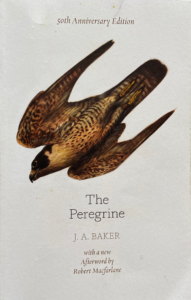
The 50th anniversary edition of The Peregrine (first published in 1967) is a truly magnificent piece of nature writing. Written in diary form over the course of a single Winter, Baker takes the reader through his almost daily pursuit of peregrines around the Essex coast and nearby woodlands. Through the diary style, Baker encourages us to savour each day: to not rush into the next, to be slow and measured, and apply the same patience Baker forges in his seasonal tracking of these raptors.
With no overall plot, you could even read each entry as bullet non-fiction or a short story. The only real progression is in Baker’s slow acceptance by the birds, as a relationship forms between man and peregrine. To me though, an overt plot isn’t essential; each day can be likened to a single painting in The Peregrine’s gallery of Nature. The prose is brimming with poetic imagery and metaphor. Two examples that struck me were:
‘Wings pliant as willow, body firm as oak’
‘’…fierce eyes glowed and dimmed and glowed again, as though a yellow flame burned beyond the iris, and spat out flakes of fire, and then diminished’
Such is the style of writing and immersion in The Peregrine that despite each day having similar motifs, the magnetism of the description and the cadence of delivery mean you are propelled through the scenes. Again, for full immersion, the reader must strike a balance between slowing down to embed within the days presented of the book, which is offset by Baker’s own obsession, which comes through in the writing.
As a true reflection of Nature, it is not all life and light. Peregrines are carnivorous birds and Baker examines his fair share of carcasses, delivering those descriptions, alongside the preceding kill, in hauntingly beautiful fashion.
Whilst there isn’t an obvious story, you could tentatively suggest that we observe how the relationship of Baker and the birds he so tirelessly pursues, changes over time. Baker is able to get steadily closer to his subjects, and in doing so it is possible that some loss of ‘human-ness’ could well be the driver. Though The Peregrine is not adopting a strident conservation or environmentalist perspective, it is implicit in Baker’s reverie for the subject matter and the awareness he shows of how damaging humans can be to other animals of the natural world. It is probably Baker’s quest to bridge that gap between ‘us’ and ‘them’: ‘man’ and ‘bird’, which fuels his trips and enriches his reporting. Certainly, in this 50th anniversary edition, Robert MacFarlane delves deeper into these themes with greater eloquence than I possibly could in an Afterword.
Who then should read this book? The obvious answer is anyone even vaguely interested in Nature writing. But even this is perhaps too simplistic: the poetic prose of each scene and the tenacity and vigour for which Baker applies to his Winter peregrine pilgrimage means there are additional depths that I think can be enjoyed by all readers.
D